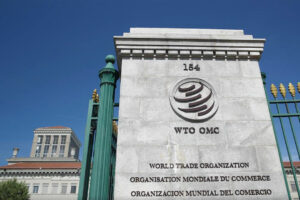By Revin Mikhael D. Ochave, Reporter
THE PHILIPPINES should maximize the opportunities on offer from a deal reached at the 12th Ministerial Conference (MC12) of the World Trade Organization (WTO), particularly in the areas of vaccines and fisheries, analysts said.
George N. Manzano, University of Asia and the Pacific economist and former tariff commissioner, said in a mobile phone interview that the ministerial decision on Trade-Related Aspects of Intellectual Property Rights (TRIPS) waives patent protections on the production of coronavirus disease 2019 (COVID-19) vaccines, providing opportunities for the incoming Marcos administration to boost domestic vaccine output.
President-elect Ferdinand R. Marcos, Jr., is set to take office on June 30.
“The incoming administration can use the TRIPS waiver to boost local production of vaccines by… invit(ing) foreign partners to set up production facilities in the country. By doing so, the vaccine rollout will be carried out faster,” Mr. Manzano said.
“The partial patent waiver is the right step in forging a collective response to the pandemic. The challenge for the Philippines… is to upgrade the capacity to produce the vaccine. This may involve investment in productive resources. In short, implementation and securing partners are now part of the challenge for which the private sector is a key actor,” he added.
During the MC12 held in Geneva, which ended on June 17, the 164 WTO members agreed to limit the patent rights on COVID-19 vaccines by allowing the use of patents “without the consent of the right holder to the extent necessary to address the COVID-19 pandemic,” subject to certain conditions.
The waiver is applicable for five years and may be extended “taking into consideration the exceptional circumstances of the COVID-19 pandemic.”
WTO members will also decide, within six months, on the waiver being expanded to COVID-19 diagnostics and therapeutics, while also blocking the re-export of COVID-19 vaccines produced under the waiver.
Trade ministers at MC12 also reached consensus on restricting harmful subsidies that result in illegal, unreported and unregulated fishing.
Mr. Manzano said that the agreement on fisheries bodies well for fisherfolk.
“The fisheries agreement calls for limiting or ending subsidies to fisheries in the unregulated high seas, particularly beyond the economic zones. This would be good for sustaining the stock of fishery resources, in the light of overfishing. The Philippines can (gain) flexibility in the treatment of aid to poor and artisanal fisheries,” Mr. Manzano said.
Kristine C. Francisco-Alcantara, managing partner of legal trade and technology firm Abad Alcantara and Associates and a Foundation for Economic Freedom fellow, said in a phone interview that the incoming administration could also take advantage of the MC12 agreement not to restrict food exports.
There is scope for “developing similar aggressive policies to improve food security in the Philippines,” Ms. Francisco-Alcantara said, noting that the World Food Programme has won an exemption from export prohibitions or restrictions.
“The focus on food security… as a means to remove barriers to trade is a good start to the WTO’s efforts in dealing with a global trade crisis,” Ms. Francisco-Alcantara said.
“While the provisional extension on the e-commerce tariff moratorium may be seen as advantageous in aiding global digitalization, the WTO needs to start a definitive discussion on trade policies and rules on the digital economy,” she added.
“The TRIPS waiver is also an opportunity to improve the health system (by) enabling a business environment where low cost medicine can be manufactured locally,” she added.
Ms. Francisco-Alcantara said that results of MC12 confirmed the relevance and necessity of the WTO, which demonstrated that multilateral cooperation is possible despite the global crisis.
“The next step is for these discussions to take on a deeper level, not to be reactive in a crisis, but to be proactive,” Ms. Francisco-Alcantara said.
